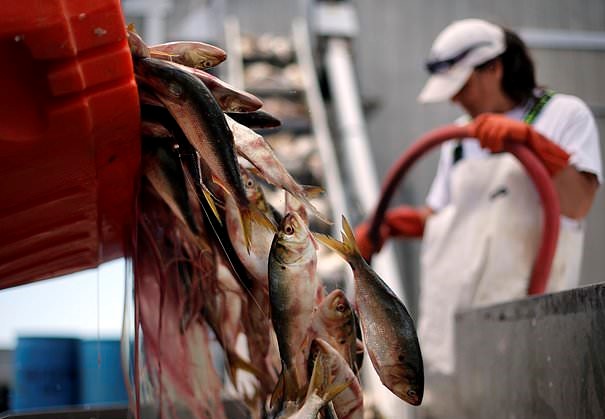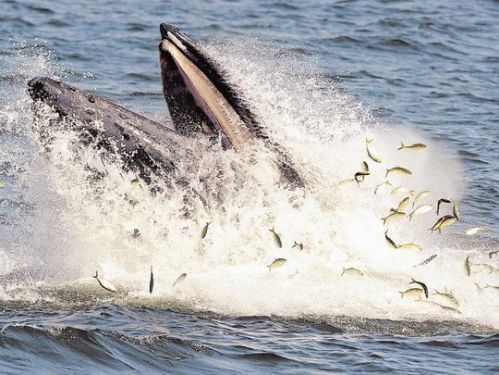Menhaden, a fish at the bottom of the ocean’s food chain, is also staying put at the bottom of the menu for Atlantic saltwater fisheries management for at least two more potentially risky years, many stakeholders say.
The Atlantic States Marine Fisheries Commission decided to continue managing menhaden as a single species instead of bigger players in broader ecosystems during a two-day meeting this week in Linthicum, Maryland. For advocates of an ecosystem-based approach, the years-long battle for the bunker was also a battle for striped bass, dolphins, whales, osprey and other prized saltwater stars that feed on thick schools of oily menhaden.
“The commission failed to protect menhaden as prey [and] risked conservation gains by increasing the 2018 and 2019 catch limits,” Peter Baker, northeast director for U.S. ocean conservation for the Pew Charitable Trusts, said in an email.
 The ASMFC voted 16-2 Monday to keep the status quo and also 15-3 Tuesday to raise menhaden catch limits by 8 percent to 216,000 metric tons for 2018 and 2019. Some fishing company reps and other opponents feared redefining menhaden by potentially landmark “ecological references points” might reduce the total allowable catch to less than 150,000 tons.
The ASMFC voted 16-2 Monday to keep the status quo and also 15-3 Tuesday to raise menhaden catch limits by 8 percent to 216,000 metric tons for 2018 and 2019. Some fishing company reps and other opponents feared redefining menhaden by potentially landmark “ecological references points” might reduce the total allowable catch to less than 150,000 tons.
“We believe in ecosystem management but we’re not quite ready for it,” Jeff Reichie, president of Cape May, N.J.-based Lund’s Fisheries, told Undercurrent, a seafood business journal.
 Florida, represented on the ASMFC by Jessica McCawley and Jim Estes of the state Fish and Wildlife Conservation Commission, William Orndorf of Indialantic, and Thad Altman of Melbourne, voted in favor of the status quo and against raising the total allowable catch.
Florida, represented on the ASMFC by Jessica McCawley and Jim Estes of the state Fish and Wildlife Conservation Commission, William Orndorf of Indialantic, and Thad Altman of Melbourne, voted in favor of the status quo and against raising the total allowable catch.
“While the Amendment maintains current reference points, the board placed the development of menhaden-specific ecological reference points as its highest priority,” ASMFC board chairman Robert Ballou of Rhode Island said in a statement.
In the runup to the vote, the commission received roughly 158,000 public comments; more than 127,000 favored considering menhaden’s unique role in healthy oceans as a forage fish. A diverse alliance of supporters included chefs, scientists, charter fishing captains, coastal conservationists, birders, scuba businesses and clubs, and eco-tourism providers.
“While the board’s action was not supported by the majority of public comment received,” Ballou said, “it is still a conservative management action relative to our understanding of stock status.”
Environmental groups say populations of iconic marine species rise and fall with menhaden stocks, which have struggled in the past because of overfishing.
“This decision ... is simply shocking,” Richen Brame of the Coastal Conservation Association told Sport Fishing Magazine. “The board had a historic opportunity to positively impact not just the management of menhaden but also the future of iconic species such as striped bass, bluefish, king mackerel as well as a host of birds and marine mammals. Today’s vote was a misguided step in the wrong direction, and really a step back in time when it comes to marine resource management.”
The ASMFC said ecosystem-based analysis of menhaden will be part of the process leading up to the 2019 stock assessment.
"The clock is ticking for [the ASMFC] to deliver on its commitments,” Baker said. "Wildlife on the East Coast will suffer for these choices as will people who enjoy fishing for striped bass or watching whales."
» Photos via Associated Press (top); NJ.com / Tyson Trish; Virginia Pilot (thumbnail).
Outside
Bitcoin mining emissions in China will hit 130 million tonnes by 2024 https://t.co/w6He7so8N2 pic.twitter.com/qYUDtBdeRK
— New Scientist (@newscientist) April 9, 2021
The Gunk Report
For the Blue-Green Algal Bloom Weekly Update from the Florida Department of Environmental Protection, tap here. For DEP's Algal Bloom Sampling Map, tap here.
What, me worry?
» "PLAYING WITH SHARKS," which recently premiered at the Sundance Film Festival, documents diving legend Valerie Taylor.